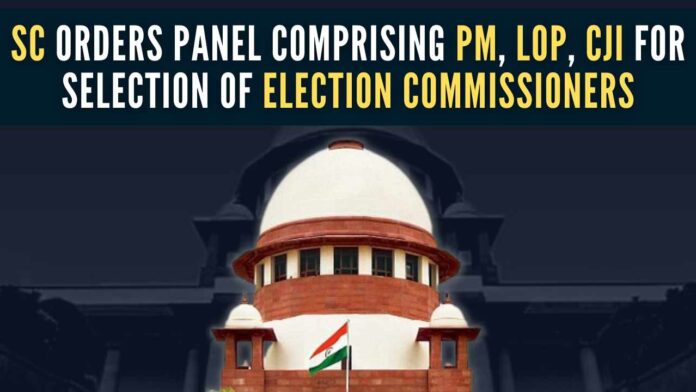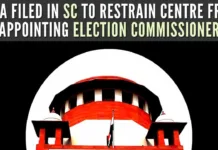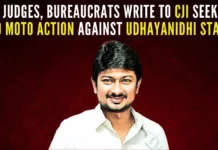
Apex Court doesn’t want govt involvement in judicial appointments
In a landmark judgment by taking out the power of the government to appoint Election Commissioners, the Supreme Court on Thursday ruled that the appointment of the Chief Election Commissioner and ECs will be made by the President on the recommendation of a committee, comprising the Prime Minister, Leader of the Opposition in the Lok Sabha and the CJI, to maintain the “purity of election” in a democracy. The five-judge constitution bench headed by Justice K M Joseph also said the “unrelenting abuse” of the electoral process over a period of time is the “surest way to the grave of democracy”.
In a democracy, the “purity of election” must be maintained or else it would lead to “disastrous consequences”, the bench said. The direction on the EC appointments will continue to hold good till a law on the issue is made by Parliament, said the verdict. As of now, Chief Election Commissioner and ECs are appointed in terms of Article 324 of the Constitution by the President on the recommendation of the Centre. The apex court said if the leader of the opposition in the Lok Sabha is not there, then the leader of the single largest opposition party will be in the committee to select the CEC and ECs.
The bench delivered its verdict on a petition filed by noted lawyer Prashant Bhushan and other pleas seeking a collegium-like system for the appointment of election commissioners and the Chief Election Commissioner. “We declare that as far as the appointment to the post of CEC and the ECs are concerned, the same shall be done by the President of India on the basis of the advice tendered by a committee consisting of the Prime Minister of India, the leader of the opposition in the Lok Sabha and in case there is no such leader, the leader of the largest party in the opposition in the Lok Sabha having the largest numerical strength and the Chief Justice of India,” Justice Joseph said while reading out the operative part of the judgment.
“This norm will continue to hold good till a law is made by the Parliament,” said the bench, also comprising Justices Ajay Rastogi, Aniruddha Bose, Hrishikesh Roy, and C T Ravikumar. Justice Rastogi, who concurred with the lead judgment, authored by Justice Joseph, delivered a separate verdict with his reasoning.
“The unrelenting abuse of the electoral process over a period of time is the surest way to the grave of democracy,” the bench said, adding that the means to gain power in a democracy must remain pure and abide by the Constitution and the laws. Democracy is intrinsically linked to the will of people, said the Judgment.
“Democracy can succeed only when all the stakeholders uncompromisingly work at it and the most important aspect of democracy is the very cautious electoral process, purity of which alone reflect the will of the people,” it said. The top court said undoubtedly, the Election Commission is duty-bound to act fairly and legally and must abide by the provisions of the Constitution.
“The fate of the political parties and its candidates and therefore of democracy itself to a great measure is allowed to rest in the hands of the Election commission. While there may be officers who assist the commission, vitally important decisions have to be taken by those who are at the helm of affairs,” it said.
“It is the CEC and the ECs at whose table the buck must stop,” the bench said. The apex court said there cannot be any doubt that the poll panel needs to perform the enviable task of remaining aloof from all forms of subjugation by interference from the executive. It said that an Election Commission, which does not ensure a free and fair role in the process, guarantees the breakdown of rule of law, which is the bedrock of democracy. The bench said that democracy is fragile and would collapse if “lip service” is paid to rule of law.
The judgment referred to Article 324 of the Constitution which deals with the appointment of members of the Election Commission and said that Parliament has not passed any law in this regard as required by the Constitution. Article 324 (2) says the Election Commission consisting of the Chief Election Commissioner and election commissioners, if any, as the President may from time to time fix and their appointments shall, subject to the provisions of any law made on that behalf by Parliament, be made by the President.
PGurus is now on Telegram. Click here to join our channel and stay updated with all the latest news and views
For all the latest updates, download PGurus App.
- Supreme Court rejects plea to tally all VVPAT slips with EVM votes; says ‘no going back to paper ballot’ - April 26, 2024
- US report citing human rights violations is deeply biased: India - April 25, 2024
- Kotak Mahindra Bank shares tank 13%. Market Cap erodes by Rs.37,721 cr post-RBI action - April 25, 2024











Judges want to nominate themselves, they vehemently oppose a role for the legislatures or the general civic bodies in the nomination/selection process but want to be a part of all other decisions!
They are tight lip on collegium system, but now want to have a seat at all admin appointments
Weaponizing non-transparent and nepotic system to facilitate corruption, and scoring browny points besides protecting corrupt, can only lead to bigger disaster more so when the will of the people is held to ransom.
Some hope for India.
The full panel and Chief needs to be appointed before the next general election in 2014.